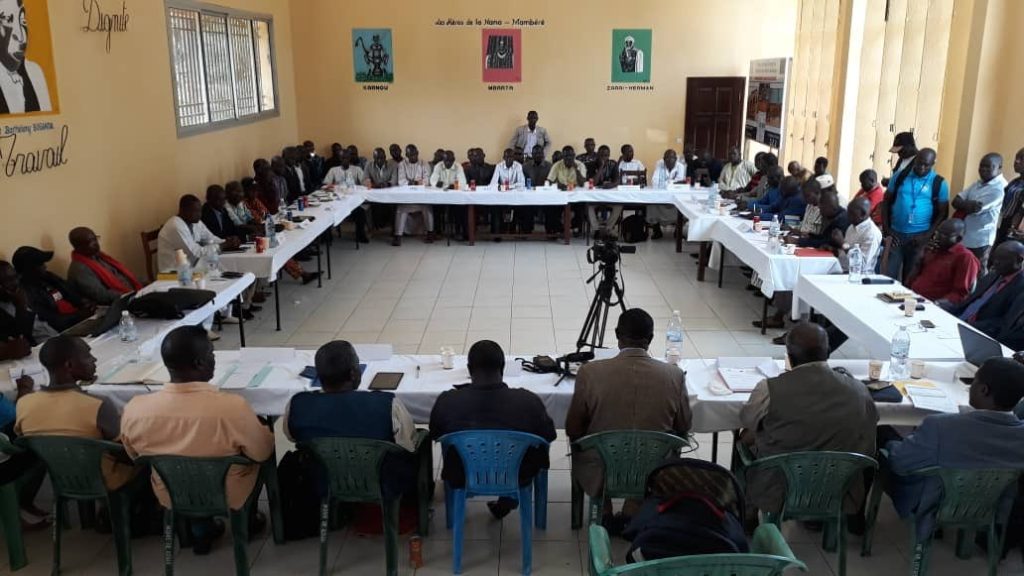Representatives from 14 militias in Central African Republic have held “positive” talks that could lead to negotiations with the government, the African Union which is acting as a mediator said on Friday, August 31.
The talks in Bouar in western CAR ran in parallel to a dialogue brokered by Russia between rival militias in Sudan that led to the Tuesday signing of a declaration of understanding between the armed groups.
Supported by the United Nations and other international partners, an A.U. panel has been working to set up negotiations between the militias and the government since July 2017.
Francis Che, a spokesperson for the African Union expert panel, said the “positive meeting in Bouar ended yesterday with a single document on demands, signed by the representatives of the 14 armed groups.”
The document will now be put to the government as “the basis for negotiations between the two sides,” Che said. It contains 104 demands, more than they had put forward previously in draft form.
Last week media reported on a list of dozens of demands the militias were to present to the African Union expert panel. RJDH reported that the list includes 12 “non-negotiable” demands, including the development of a national dialogue that will lead to constitutional change, a means for the armed groups to transform into political organizations, and a general amnesty for fighters.
Five issues have been “put to one side” by the A.U., including the demand for a general amnesty.
Last week, five human rights organizations united in opposition to an amnesty for the armed groups which they said “would be incompatible with the government’s duty to bring those responsible for grave international crimes to justice.”
A special criminal court has been set up in Central African Republic to investigate war crimes and crimes against humanity since 2003. Several militia leaders have been cited in U.N. investigations and others are named in international arrest warrants.
Russia-brokered agreement in Khartoum
Separate to the African Union initiative, Russia and Sudan this week hosted talks between some of the rival militias.
In Khartoum on Tuesday, rival ex-Seleka and anti-Balaka armed groups signed a declaration of understanding which said they had decided to “create a common framework for dialogue and action for a real and lasting peace,” a “national platform” which they called the Rassemblement Centrafricain – the Central African Rally.
The platform is “highly attached to the African Union initiative for peace and reconciliation” and is “resolutely committed” to ensuring the security of the population and free movement of people and goods, as well as safeguarding territorial integrity and sovereignty, the document said.
Four ex-Seleka leaders and one anti-Balaka leader signed the Khartoum declaration of understanding.
The Russia-brokered agreement was met with a cool response from CAR’s government.
In a statement, the government said it “takes note of the declaration” signed in Khartoum but “supports the A.U.’s initative for peace and reconciliation,” reiterating that “peace, security, and the restoration of the authority of the state” are the government’s main objectives.
In July, Russia attempted to arrange a meeting in Sudan to mediate between the government and the militias, but President Faustin-Archange Touadera’s office said the initiative was dropped as “the head of state believes there is no cause to engage in other processes while the African Union one is still under way.”
However, in a possible sign of rapprochement, the Russian foreign minister’s special envoy and ambassador-at-large Konstantin Shuvalov travelled to Bangui from Khartoum on August 29 to meet Touadera, who “thanked Russia for its effort,” according to Tass.
Russia’s foreign ministry said Moscow “plans to continue its mediation efforts for the beginning national reconciliation process in the country,” adding that it will act in coordination with the A.U. and U.N.
A country divided
Despite reserves of diamonds, gold, uranium, copper and iron, Central African Republic is one of the world’s poorest countries.
The majority-Christian country descended into violence following the 2013 ousting of President Francois Bozize in 2013 by the Seleka, a coalition of mainly Muslim rebel groups.
Seleka was officially disbanded within months, but many fighters refused to disarm, becoming known as ex-Seleka. Many others joined the mainly Christian anti-Balaka militia to fight the Seleka, leading to a spiral of violence between groups along both religious and ethnic lines.
By the end of 2014, the country was de facto partitioned – anti-Balaka in the southwest and ex-Seleka in the northeast.
Violence by both sides led to thousands of deaths. Nearly 700,000 people are displaced, 570,000 have fled the country and 2.5 million are in need of humanitarian aid, according to the U.N.
Touadera’s weak government controls around a fifth of the country and relies heavily on the United Nations peacekeeping mission, Minusca, for support. The rest is controlled by at least 14 different militia groups who often fight each other for control of revenue from extortion, roadblocks or mineral resources.
Seven peace agreements have been signed in the CAR over the past six years but none has had a lasting effect.
With reporting from AFP



